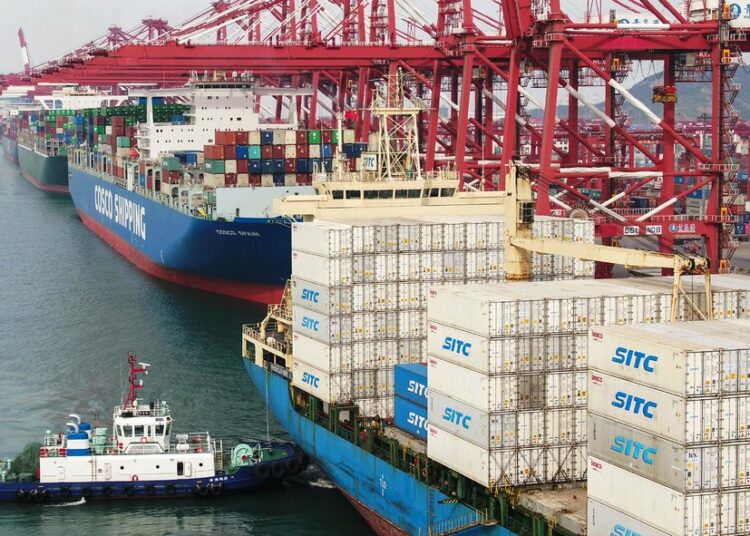The threat of a global economic recession appears imminent as businesses tumble over fears of new tariffs about to be imposed by US President Donald Trump, sending shock waves across the world.
US stock markets have reportedly fallen again as President Trump is set to unleash a massive slew of import taxes on Wednesday, which he has dubbed America’s “Liberation Day.”
Global stock markets also fell. Japan’s Nikkei index closed down more than 4 per cent, while in London, the FTSE 100 lost around 1 per cent in early trading.
This scary moment comes after the US president threatened that the new tariffs he is set to announce this week will hit all countries, not just those that have the biggest trade imbalances with the US.
Authorities in the United Kingdom have said they “expect” the UK to be affected by US tariffs and are set to respond in a retaliatory manner.
To make matters even more difficult, the measures will be in addition to tariffs already imposed by Washington on aluminium, steel, and vehicles, as well as increased levies on all goods from China.
Major global share markets fell sharply on Monday, and gold surged to another new record. The threat that the tariffs would essentially cover all countries is already stoking apprehension of a global trade war that could lead to a recession.
“What the Trump administration has shown us so far is that you should not expect a consistent approach,” George Lagarias, chief economist at Forvis Mazars, said, adding, “This is what scares the market the most. Inconsistency breeds uncertainty, and markets hate uncertainty.”
Ajay Rajadhyaksha, head of rates markets at Barclays, said, “For the first time in years, we find ourselves genuinely worried about risk assets.
“If policy chaos and trade wars worsen much further, a recession is now a realistic risk across major economies. For the first time in many quarters, we favour core fixed income over global equities.”
There are fears that tariffs will hit the US economy hard, even as they limit the Federal Reserve’s scope to cut rates by driving inflation in the short term.
Reports said that analysts at Goldman Sachs now see a 35 per cent chance of a U.S. recession, up from 20 per cent previously. They said they expect Trump to announce reciprocal tariffs that average 15 per cent across all U.S. trading partners on April 2.
The cryptocurrency market also faces renewed pressure as trade war tensions escalate, and leveraged positions unwind, leading to a significant market downturn.
A report by Cointelegraph revealed that on March 27, the total market capitalisation of digital assets fell 0.91 per cent to approximately $2.77 trillion, down from its week-to-date high of $2.86 trillion.
The latest decline in crypto prices coincides with escalating trade tensions following the U.S. government’s March 25 announcement of 25 per cent tariffs on auto imports and other goods from Canada, Mexico, and China, set to take effect on April 3.
The move, part of President Donald Trump’s broader protectionist agenda, has sparked concerns over global economic stability, dragging down risk assets, including cryptocurrencies.
Market analysts note that the tariffs could impact more than $1.5 trillion in imports by the end of April, raising inflation concerns and fueling uncertainty in global markets.
The Economic Policy Uncertainty (EPU) Index has surged to 600, an 80 per cent increase from levels seen during the 2008 financial crisis. Historically, such spikes have preceded major market moves, intensifying investor risk aversion.
Beyond macroeconomic concerns, the crypto market’s downturn has been exacerbated by a wave of long liquidations, which have outpaced short positions, adding downward pressure on prices.
For instance, Bitcoin (BTC) witnessed net liquidations of $62.45 million in the past 24 hours, with $48.94 million of these being long positions.
Ethereum (ETH) saw over $43 million in long liquidations, part of a total of $51.76 million in liquidated positions.
Overall, crypto market liquidations reached $257.35 million in the last 24 hours, with $198.11 million in long positions.
The sharp market correction follows a period of bullish optimism, with traders heavily positioned in long bets on Bitcoin, Ether, and other leading digital assets.
The unexpected tariff announcement and fears of renewed inflation caught the market off guard, triggering a chain reaction of liquidations.
Technical indicators suggest further downside risks for the cryptocurrency market. A rising wedge formation on the total market capitalisation chart signals a potential bearish reversal.
The market cap is currently hovering below $2.78 trillion, with a crucial support level at $2.75 trillion.
A breakdown from this level could send the total crypto market valuation tumbling towards $2.54 trillion. Declining volume and convergence of the 50-day EMA ($2.88T) and 200-day EMA ($2.86T) suggest strong resistance, limiting any potential upside recovery.
Commenting on the development, Ambrose Omordion, chief operating officer of InvestData Consulting Limited, said stakeholders are increasingly concerned about the potential economic impact of a global trade war, particularly with the US imposing new tariffs on imports from countries like China, Canada, and Mexico.
He urged Nigeria to diversify its economy to reduce its reliance on oil exports and mitigate the effects of the trade war.
The director/CEO of the Centre for the Promotion of Private Enterprise (CPPE), Dr. Muda Yusuf, stated that the US economy is experiencing record disruption in its economic, trade, and political governance systems. These developments have multi-dimensional implications for the Nigerian economy.
He added that “the Trump administration has demonstrated an unequivocal commitment to the ideology of economic nationalism, protectionism, deglobalisation, unilateralism, reciprocity, and fragmentation of the global economy.
“This has unleashed a flurry of retaliatory trade policy actions from several countries across a wide range of product groups, even by the close allies of the United States.”
For her part, the director-general of the Lagos Chamber of Commerce and Industry (LCCI), Dr. Chinyere Almona, noted that the trade war between the United States and its largest trading partners, Canada, Mexico and China, was expected to create new trade opportunities for many countries, including Nigeria.
She, however, said, “It may also lead to a complex trade landscape for businesses depending on how Nigeria positions itself. For instance, Nigeria may seize the opportunity to boost its exports of the tariffed products to the United States, China, Canada, Mexico, and other markets.”
The director-general of the National Association of Chambers of Commerce, Industry, Mines and Agriculture (NACCIMA), Sola Obadimu, pointed out that Nigeria needed to develop a trade policy that would favour and protect the nation.
He stated that every nation was developing trade policy to favour them and protect them, saying that “those in charge of our trade policy should bring out policy that will protect us.”
Speaking on how the trade war will impact Nigeria and Africa, Futureview Group said that “while commodity-dependent economies like Nigeria may face risks from falling oil prices, foreign investment slowdowns, and currency pressure, there are also opportunities for Nigerian exporters to gain market share in the U.S. and other regions.”
It noted that “with the right policies and investor strategies, Nigeria can turn global challenges into new economic opportunities. Meanwhile, Nigeria must act strategically to diversify its economy, strengthen local industries, and leverage emerging trade opportunities in a rapidly shifting global landscape.”





